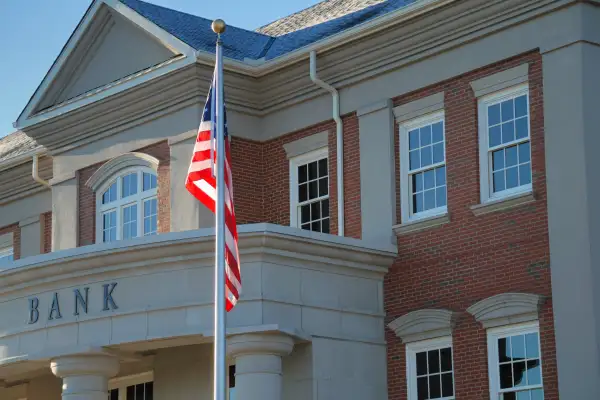Worried About Your Credit Score? Here's How to Get the Best Rate on Your Mortgage

Trying to get a good mortgage rate without the world's best credit score? New research suggests you shouldn't overlook old-fashioned, brick-and-mortar banks.
Even with interest rates at historic lows, getting a home loan at a great rate isn’t necessarily an easy task these days. If you have weak credit, securing a mortgage is an even bigger challenge. Some big lenders have embraced credit score minimums for new borrowers as they try to stave off potential forbearance requests or delinquency.
Yet despite the publicity these announcements have gotten, a new report from the Housing Finance Policy Center at the Urban Institute finds that borrowers with weaker credit may actually be better off going through a traditional bank than a non-bank lenders for a mortgage.
Non-bank lenders are companies that specialize in writing mortgages, and, unlike banks, don't take deposits by offering customers checking or savings accounts. These special mortgage companies have thrived in the years since the financial crisis, as traditional banks grew skittish about the housing market.
Today, non-banks write more than half of a mortgages as companies like Quicken and LoanDepot have become household names. (Quicken, the nation's largest lender, and LoanDepot didn't immediately respond to emails seeking comment on the new research.) While non-bank lenders have traditionally been more accessible to borrowers with lower credit scores, that access can come with higher — sometimes much higher — interest.
“What our analysis shows is that people with lower credit scores are the ones that are not seeing their mortgage rates come down to the same degree,” says Michael Neal, a senior research associate at the organization and one of the paper’s two authors.
“They’re facing an even greater burden because that difference in mortgage rates is widening,” he says.
Neal and his co-author Laurie Goodman looked at the difference in mortgage and refinance rates that someone with a credit score above 720 could get with those attainable to people whose scores fell below 660. They compared what those spreads were last November with where they were last month, when the pandemic was bearing down on financial markets.
In November, the mortgage rate difference between high and low scores was 60 basis point (0.6 of a percentage point) at banks and 64 basis points at nonbank lenders. Last month, that spread widened to 64 basis points at banks and 83 basis points at nonbanks — a significant jump that would make using a traditional bank a better financial choice.
If you’re seeking to refinance your existing mortgage, the researchers present an even more compelling reason to use a bank: The difference between high and low-credit rates right now is 45 basis points, which is actually an improvement over the 48 basis point spread last November. At nonbank lenders, meanwhile, the spread has doubled, jumping to 62 basis points.
Nonbank lenders don’t have the same kind of capital cushion that banks are required to hold, so a spike in forbearance or default activity would be a bigger financial hit for them, Neal says. Even a recent announcement from the housing regulator that oversees Fannie Mae and Freddie Mac that those entities will be allowed to purchase loans in forbearance — which traditionally have been ineligible — will only have marginal implications.
“The risk of mortgage lending continues to be elevated,” Neal says.
More from Money:
It's Becoming Harder to Refinance Your Mortgage. Here's What Lenders Say Will Get You Approved

